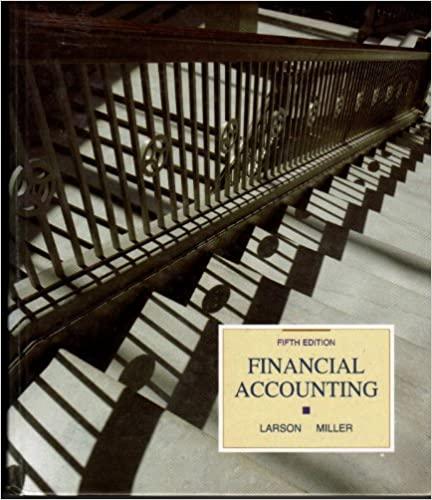Solomon Company had no short-term investments on December 31, 1989, but had the following transactions involving short-term
Question:
Solomon Company had no short-term investments on December 31, 1989, but had the following transactions involving short-term investments during 1990.
\footnotetext{
Jan. 10 Paid \(\$ 40,000\) to buy six-month, U.S. Treasury bills, \(\$ 40,000\) principal amount, \(8 \%\), dated January 10 .
}
Feb. 3 Purchased 600 shares of AT\&T common stock at \(301 / 2\) plus a \(\$ 300\) brokerage fee.
16 Purchased 400 shares of Boeing common stock at \(431 / 4\) plus a \(\$ 200\) brokerage fee.
Mar. 1 Paid \(\$ 30,000\) for U.S. Treasury Notes, \(\$ 30,000\) principal amount, \(9 \%\), dated March 1, 1990, due March 1, 1994.
28 Purchased 1,000 shares of Syntex common stock at \(451 / 8\) plus a \(\$ 675\) brokerage fee.
June 1 Received a \(\$ 0.30\) per share cash dividend on the AT\&T common shares.
17 Sold 400 shares of AT\&T common stock at 32 less a \(\$ 200\) brokerage fee.
July 12 Received a check for the principal and accrued interest on the U.S. Treasury bills that matured on July 10 .
Aug. 14 Received a \(\$ 0.35\) per share cash dividend on the Boeing common shares.
Sept. 1 Received a check for six-months' interest on the U.S. Treasury Notes purchased on March 1.
1 Received a \(\$ 0.30\) per share cash dividend on the remaining AT\&T common shares owned by Solomon Company.
Nov. 14 Received a \(\$ 0.35\) per share cash dividend on the Boeing common shares.
On December 31, 1990, the market prices of the equity securities held by Solomon Company were: AT\&T, 331/2; Boeing, 42; and Syntex, 387/8.
\section*{Required}
1. Prepare general journal entries to record the above transactions.
2. Prepare a schedule to calculate the lower of cost or market of Solomon's short-term investments in marketable equity securities.
3. Prepare adjusting entries, if necessary, to record accrued interest on Solomon Company's investments in debt obligations and to reduce the marketable equity securities to the lower of cost or market.
Step by Step Answer:






